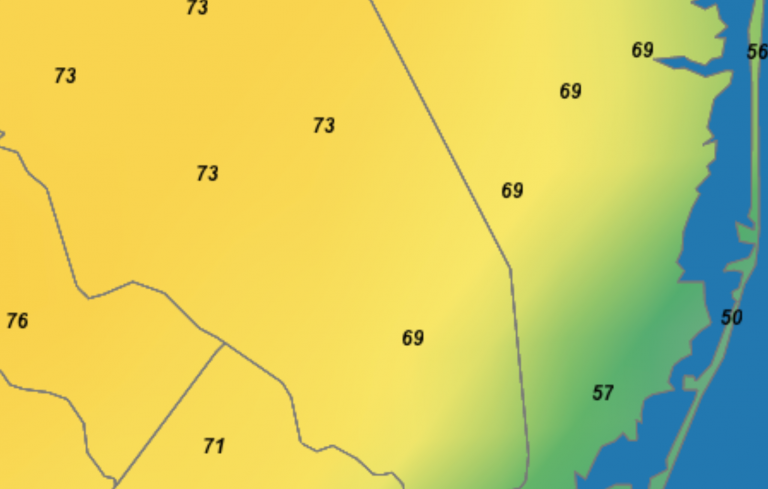Why is it typically cooler along the coast during unseasonably warm days?
It’s courtesy of the sea breeze effect.

Temperatures in South Jersey at 3 p.m. on Friday, March 15. (Image: New Jersey Weather & Climate Network)
It happens every late winter and spring at the Jersey Shore.
Temperatures spike into the 70s inland, and that immediately sparks imagery of relaxing on the beach in your bathing suit to get your first sunburn of the season while watching the gentle Atlantic Ocean waves lap at the shoreline.
But not so fast. (That’s if you don’t mind sunbathing in the much cooler temperatures at the beaches.)
If you’re a longtime radio listener, the words “cooler at the coast” probably ring a bell, and the temperature differences can be extreme at times.
During the summer, beachgoers along the oceanfront can be enjoying temperatures in the 70s while just inland, everyone else is baking in the 90s.
Or during the late winter, like today, shortly after 3 p.m. it’s 50 degrees in Harvey Cedars but inland Ocean County is reporting temperatures near 70. It’s even warmer in Monmouth County, where some inland locations are approaching the upper 70s.
It’s courtesy of the sea breeze effect. In a 2017 WHYY interview, National Weather Service meteorologist Walter Drag explained that it occurs due to the difference between the warm air over land and cool air hovering over the ocean (currently in the middle 40s).
“What you have is, when wind increases during the day, cooler air is heavier, and it’s drawn inland, replacing the warmer air that’s rising. Winds can begin westerly, then when the land heads up, turns southwesterly and then southerly,” he says, stating that the air along the coastal areas becomes cool due to ocean air getting pushed along the coast and inland.
Sometimes, Drag says, if the offshore winds are weak, the sea breeze can dominate and push as far west as the I-95 corridor or even Philadelphia. The stronger the westerly or northwesterly winds, the less sea breeze inward force.
Ocean temperatures are slow to warm and don’t generally reach the 70s until August, so that’s why the sea breeze effect is so dominant through late summer, according to Drag.
WHYY is your source for fact-based, in-depth journalism and information. As a nonprofit organization, we rely on financial support from readers like you. Please give today.




